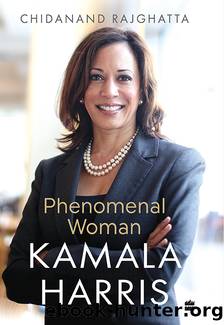Kamala Harris by Chidanand Rajghatta

Author:Chidanand Rajghatta
Language: eng
Format: epub
Tags: null
Publisher: HarperCollins
Published: 2021-02-15T00:00:00+00:00
9
THE VICE SQUAD
THE VICE PRESIDENT of the United States typically rides on the coattails of the president. The 1787 Constitutional Convention in Philadelphia that drafted the rules pertaining to electing the president did not even mention the office of the vice president. It was an afterthought aimed at ensuring that no single big state hogged all power, if its electors chose a local âfavourite sonâ. Although not written into law, the protocol was, the vice president had to be from a different state from that of the president.
Still, the framers did not bestow any power on the vice president. In fact, no provision was made for replacing vice presidents who died or departed before finishing their terms. As a result, the office has been vacant for almost thirty-eight years in US history. Some presidents did not care to have vice presidents, some sidelined them, and some forgot they even existed. When William R. King, the countryâs thirteenth VP, died in 1853, just forty-five days after being sworn in, President Franklin Pierce only briefly acknowledged his death at the end of a speech addressing other matters, and didnât even bother to replace him. In 1876, when it was suggested to Rutherford Hayes, the countryâs nineteenth president, that he choose a quiet congressman named William Wheeler as his VP nominee, he is said to have asked: âWho is Wheeler?â Herbert Hoover failed to mention his vice president, Charles Curtis (who was part Native American from the Kaw tribe), in his inaugural address. Adlai Stevenson (the first of a long line of Adlai Stevensons) was once asked if President Grover Cleveland had consulted him about anything of even minor consequence: âNot yet,â he replied. âBut there are still a few weeks of my term remaining.â1
Small wonder then, that the office was largely deemed inconsequential, not even ceremonial, much less a sinecure: âa final resting place for has-beens and never-wases.â2
Even the countryâs founding fathers thought poorly of it, leaving out any specific description of the roleâs requirements in the Constitution beyond casting tie-breaking votes in the senate â a part Mike Pence was called upon to play the highest number of times in nearly 150 years. John Adams, the first vice president of the United States, called it âthe most insignificant office ever that the invention of man contrivedâ. His successor Thomas Jefferson regarded the office as a âtranquil and unoffending stationâ, and spent much of his tenure at his estate in Monticello pursuing other interests. George Dallas, the countryâs eleventh veep, who called his wife âMrs Viceâ, maintained a lucrative private law practice, musing about himself, âWhere is he to go? What has he to do? â Nowhere, nothing.â Once, Theodore Roosevelt wanted a chandelier taken down in the White House because the tinkling bothered him whenever he opened the windows in the evening to let the breeze in. When the butler asked, âWhere do we take it?â he is reported to have replied, âTake it to the vice president, he needs something to keep him awake.
Download
This site does not store any files on its server. We only index and link to content provided by other sites. Please contact the content providers to delete copyright contents if any and email us, we'll remove relevant links or contents immediately.
Down the Drain by Julia Fox(981)
The Light We Carry by Michelle Obama(899)
Cher by Cher(798)
Simple Passion by Annie Ernaux(747)
Love, Pamela by Pamela Anderson(603)
The Nazis Knew My Name by Magda Hellinger & Maya Lee(579)
Zen Under Fire by Marianne Elliott(564)
You're That Bitch by Bretman Rock(551)
Novelist as a Vocation by Haruki Murakami(543)
Alone Together: Sailing Solo to Hawaii and Beyond by Christian Williams(532)
The Foxfire Book of Appalachian Women by Kami Ahrens(531)
Kamala Harris by Chidanand Rajghatta(496)
Gambling Man by Lionel Barber(490)
The Barn by Wright Thompson(440)
Drinking Games by Sarah Levy(430)
A Renaissance of Our Own by Rachel E. Cargle(418)
Limitless by Mallory Weggemann(417)
A new method to evaluate the dose-effect relationship of a TCM formula Gegen Qinlian Decoction: âFocusâ mode of integrated biomarkers by unknow(416)
Memoirs of an Indian Woman by Shudha Mazumdar Geraldine Hancock Forbes(415)
